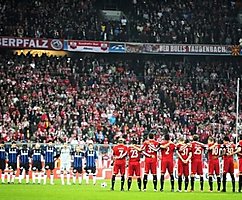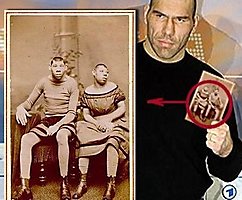Guy Kawasaki: What I Learned From Steve Jobs
 Bashny.Net
Bashny.Net
There are many publications that explain what we can learn from Steve Jobs, but a few of the people who wrote them were "in the same boat" and learned from personal experience what it was like to work with him. I want none I received a lesson has not been lost or forgotten, so here are the 12 most important things I learned from Steve Jobs.

uschestvuet many publications that explain what we can learn from Steve Jobs, but a few of the people who wrote them were "in the same boat" and learned from personal experience what it was like to work with him. I want none I received a lesson has not been lost or forgotten, so here are the 12 most important things I learned from Steve Jobs.
1. The experts do not know what to do
The experts - journalists, analysts, consultants, bankers and gurus are not able to do so advised. They can say what is wrong in your product, but never create a great product for yourself. Such as a computer subwoofer, not to mention the more technological devices. They can tell you how to sell something, but they will not be able to sell. They will tell you how to create a great team, but they are able to manage only a secretary. For example, the experts tell us that the two biggest drawbacks Macintosh in 1980 was the lack of drivers chamomile printer (printer that works similarly to a typewriter, such printers are now hardly used, approx. Perevi.) And lotus-1-2-3 (product was ousted from the market MS Excel, approx. Perevi.); another great suggestion from the experts to buy Compaq. Listen to what the experts say, but do not always obey them.
2. Clients will not tell you what they need
"Market research company Apple» - is an oxymoron. The only focus group who used Apple - this conversation right brain to the left Steve. If you ask customers what they need, they say, "better, faster and cheaper" - and that the improvement of the existing, rather than a revolution in the market. Customers can describe their desires only within the existing products that they use, for example, at a time when there was a Macintosh, all said that they want faster and cheaper computers on MS-DOS. Bonanza for technological start-ups - to create a product that you do want to use, and this is what made Jobs and Wozniak.
3. Proceed to the next round of
Big wins happen when you go beyond improving existing. Most companies that produced chamomile printers offer new fonts and new dimensions of characters, Apple invited the following coil - laser printer. Think of ice harvesting (in the middle of the 19th century, ice harvesting was carried out on an industrial scale, was later superseded by new technologies refrigeration, approx. Perevi.), Factories for the production of ice and refrigerated. Ice 1.0, 2.0, 3.0. You are still harvested ice from the pond in the winter?
4. Large and complex tasks produce the best results
I lived in fear that Steve would tell me that I am or what I do - shit. In humans. This fear was for me a very difficult task. Competing with IBM and later with Microsoft has been very challenging. Change the world was a very difficult task. I and Apple employees before and after I worked to the fullest because we had completely laid out to solve big problems.
5. Design matters
Steve drives people crazy with their chicanery to design - for example, some blacks were not black. Mere mortals think that black is black, and that the trash can - a trash can. Steve was the absolute, the Beyond perfectionist - and lo and behold, he was right: some people a good design is important, and many of its least feel. Maybe not all, but those from whom something depends - exactly.
6. Large images and fonts can not be a mistake
Look at Steve's presentation slides. Font size - 60 units. Usually, the slide just one big picture or screenshot. Look at the slides of conventional speakers, even those who saw the performances of Steve. Font - 8 units, and no pictures. While a lot of people said that Steve was doing the world's best product presentations ... is not it strange that so few people copy his style?
7. The ability to change their point of view - a sign of intelligence
When Apple first introduced the world to iPhone, there was no concept of Apps. Steve decided that the third-party applications - it is bad, because you can not know for sure what they do with your phone. The only solution was web-applications for Safari, until six months later, Steve came to the conclusion (or someone to convince him) that the application - is the right way. Sure! Ha! And Apple in a short time goes a long way from the Safari web application to "for everything there is an application iPhone» («there's an app for that» - the slogan of an advertising campaign iPhone in the US, approx. Perevi.).
8. "Value" - is not the same thing as "price»
Woe to you if you choose, focusing only on price. Even more woe to you if you are competing on price alone. Price - this is not all that matters is what's really important - it's worth, at least for many people. And the value is generated from training, support and inner joy from the use of the best tools from all available. It is safe to say that no one is buying the products Apple, because it has a low price.
9. Players Class A players hire Class A +
In fact, Steve thought that the players of class A (the most professional and responsible employees, approx. Perevi.) Take the team class players - that is, the same as they are. I slightly corrected this statement - according to my theory class players have to hire people more professional than they are. However, it is quite obvious that the players of Class B will recruit players Class C, and so on. If you start to recruit level B, expect to happen in your company that Steve called "idiotografichesky explosion." (Bozo explosion - rapid growth in the number of incompetent employees, approx. Perevi.).
10. The present CEO doing demo
Steve Jobs could make presentations iPods, iPads, ayfon or Mac before an audience of millions, two or three times a year, why do so many CEO asked to speak at the presentation of the product of its director of production? Perhaps to show that the product makes the team? Maybe. But most likely, CEO does not understand what makes it the company well enough to explain it to the presentation. Agree, it looks sorry?
11. The present CEO of manufactured products
In spite of his perfectionism, Steve created the finished product. Maybe not every time the product was perfect, but almost always it was quite cool. The lesson here is that Steve created for the sake of creation - he had a goal: to achieve world domination in existing markets or creating new ones. Apple - manufacturer, not a research center. Who would you like to be - Apple and Xerox PARC (Research Center of Xerox, developed many new technologies to Apple and other companies, in particular, the laser printing and graphical interface, laptop, ethernet and the PLO, approx. Perevi.)
12. The task of marketing - offer unique value
Imagine a matrix of 2 x 2. The vertical axis shows the difference between your product from the competition. The horizontal axis measures the value of your product in the eyes of the consumer. The lower right corner: valuable, but not unique - you are competing on price. Upper left: unique, but valuable - you will win the market, which is not. Lower left: not unique and valuable - you idiot. Upper right: A unique value - that's where you make money and make history. For example, the unique value of the iPod in the United States was that it was the only way to legally, cheaply and easily download music 6 biggest record labels.
Bonus. To see some of the things they need to believe
If you are upgrading to the new coils, experts argue, raises more problems obsessed with design and focus on the unique value that your labor to bear fruit, you have to get people to believe in what you are doing. People had to believe in the Macintosh, to create it. The same can be said about the iPod, iPhone and the iPad. Not all believe it - it's normal. But changing the world starts with changing attitudes of several people. It is the most important lesson that Steve Jobs gave me.

uschestvuet many publications that explain what we can learn from Steve Jobs, but a few of the people who wrote them were "in the same boat" and learned from personal experience what it was like to work with him. I want none I received a lesson has not been lost or forgotten, so here are the 12 most important things I learned from Steve Jobs.
1. The experts do not know what to do
The experts - journalists, analysts, consultants, bankers and gurus are not able to do so advised. They can say what is wrong in your product, but never create a great product for yourself. Such as a computer subwoofer, not to mention the more technological devices. They can tell you how to sell something, but they will not be able to sell. They will tell you how to create a great team, but they are able to manage only a secretary. For example, the experts tell us that the two biggest drawbacks Macintosh in 1980 was the lack of drivers chamomile printer (printer that works similarly to a typewriter, such printers are now hardly used, approx. Perevi.) And lotus-1-2-3 (product was ousted from the market MS Excel, approx. Perevi.); another great suggestion from the experts to buy Compaq. Listen to what the experts say, but do not always obey them.
2. Clients will not tell you what they need
"Market research company Apple» - is an oxymoron. The only focus group who used Apple - this conversation right brain to the left Steve. If you ask customers what they need, they say, "better, faster and cheaper" - and that the improvement of the existing, rather than a revolution in the market. Customers can describe their desires only within the existing products that they use, for example, at a time when there was a Macintosh, all said that they want faster and cheaper computers on MS-DOS. Bonanza for technological start-ups - to create a product that you do want to use, and this is what made Jobs and Wozniak.
3. Proceed to the next round of
Big wins happen when you go beyond improving existing. Most companies that produced chamomile printers offer new fonts and new dimensions of characters, Apple invited the following coil - laser printer. Think of ice harvesting (in the middle of the 19th century, ice harvesting was carried out on an industrial scale, was later superseded by new technologies refrigeration, approx. Perevi.), Factories for the production of ice and refrigerated. Ice 1.0, 2.0, 3.0. You are still harvested ice from the pond in the winter?
4. Large and complex tasks produce the best results
I lived in fear that Steve would tell me that I am or what I do - shit. In humans. This fear was for me a very difficult task. Competing with IBM and later with Microsoft has been very challenging. Change the world was a very difficult task. I and Apple employees before and after I worked to the fullest because we had completely laid out to solve big problems.
5. Design matters
Steve drives people crazy with their chicanery to design - for example, some blacks were not black. Mere mortals think that black is black, and that the trash can - a trash can. Steve was the absolute, the Beyond perfectionist - and lo and behold, he was right: some people a good design is important, and many of its least feel. Maybe not all, but those from whom something depends - exactly.
6. Large images and fonts can not be a mistake
Look at Steve's presentation slides. Font size - 60 units. Usually, the slide just one big picture or screenshot. Look at the slides of conventional speakers, even those who saw the performances of Steve. Font - 8 units, and no pictures. While a lot of people said that Steve was doing the world's best product presentations ... is not it strange that so few people copy his style?
7. The ability to change their point of view - a sign of intelligence
When Apple first introduced the world to iPhone, there was no concept of Apps. Steve decided that the third-party applications - it is bad, because you can not know for sure what they do with your phone. The only solution was web-applications for Safari, until six months later, Steve came to the conclusion (or someone to convince him) that the application - is the right way. Sure! Ha! And Apple in a short time goes a long way from the Safari web application to "for everything there is an application iPhone» («there's an app for that» - the slogan of an advertising campaign iPhone in the US, approx. Perevi.).
8. "Value" - is not the same thing as "price»
Woe to you if you choose, focusing only on price. Even more woe to you if you are competing on price alone. Price - this is not all that matters is what's really important - it's worth, at least for many people. And the value is generated from training, support and inner joy from the use of the best tools from all available. It is safe to say that no one is buying the products Apple, because it has a low price.
9. Players Class A players hire Class A +
In fact, Steve thought that the players of class A (the most professional and responsible employees, approx. Perevi.) Take the team class players - that is, the same as they are. I slightly corrected this statement - according to my theory class players have to hire people more professional than they are. However, it is quite obvious that the players of Class B will recruit players Class C, and so on. If you start to recruit level B, expect to happen in your company that Steve called "idiotografichesky explosion." (Bozo explosion - rapid growth in the number of incompetent employees, approx. Perevi.).
10. The present CEO doing demo
Steve Jobs could make presentations iPods, iPads, ayfon or Mac before an audience of millions, two or three times a year, why do so many CEO asked to speak at the presentation of the product of its director of production? Perhaps to show that the product makes the team? Maybe. But most likely, CEO does not understand what makes it the company well enough to explain it to the presentation. Agree, it looks sorry?
11. The present CEO of manufactured products
In spite of his perfectionism, Steve created the finished product. Maybe not every time the product was perfect, but almost always it was quite cool. The lesson here is that Steve created for the sake of creation - he had a goal: to achieve world domination in existing markets or creating new ones. Apple - manufacturer, not a research center. Who would you like to be - Apple and Xerox PARC (Research Center of Xerox, developed many new technologies to Apple and other companies, in particular, the laser printing and graphical interface, laptop, ethernet and the PLO, approx. Perevi.)
12. The task of marketing - offer unique value
Imagine a matrix of 2 x 2. The vertical axis shows the difference between your product from the competition. The horizontal axis measures the value of your product in the eyes of the consumer. The lower right corner: valuable, but not unique - you are competing on price. Upper left: unique, but valuable - you will win the market, which is not. Lower left: not unique and valuable - you idiot. Upper right: A unique value - that's where you make money and make history. For example, the unique value of the iPod in the United States was that it was the only way to legally, cheaply and easily download music 6 biggest record labels.
Bonus. To see some of the things they need to believe
If you are upgrading to the new coils, experts argue, raises more problems obsessed with design and focus on the unique value that your labor to bear fruit, you have to get people to believe in what you are doing. People had to believe in the Macintosh, to create it. The same can be said about the iPod, iPhone and the iPad. Not all believe it - it's normal. But changing the world starts with changing attitudes of several people. It is the most important lesson that Steve Jobs gave me.
Tags
Personal growth
self-development
psychology
women
men
relationships
life
happiness
harmony
love
children
money
wealth
success
See also
"Personal experience raw foodists"
Struggle with depression — a personal experience
Katyusha Remizov. About cancer, humility and forgiveness
When he really did not "pull" or How strong the woman is to build relationships
How to work with e-mail Tim cook, bill gates and other top managers
How does the Internet in the subway
How to operate 3D printers and 3D scanners.
Introverts in IT. How to use the features of his character to achieve the objectives
The story of my weight loss
















